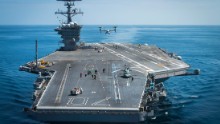The World is a Volatile Place, and So Is Donald J. Trump
"No other country can match the United States when it comes to projection of power. Should Washington decide to carry out a military strike against North Korea, even a limited one, the immediate impact would be devastating for Pyongyang. When considering military action, however, it is important to acknowledge the variables and intelligence gaps that inevitably complicate political and military decision-making. Even with the United States' advantage in training, coordination and equipment, complicating factors and uncertainty about the exact locations and dispositions of North Korean assets make complete mission success far from assured."
"It is important to consider the parameters of any operation; in this case, we are basing our assumptions on a scenario in which the United States conducts a limited, stealthy attack using a small number of specialized platforms and weapons systems. The United States has enormous force projection and deep-strike capabilities. In a surprise attack scenario, the primary tools for the task would be stealth aircraft and standoff cruise missiles launched from ships and submarines."
Stratfor, January 4, 2017
 |
An airman inspects a JDAM being loaded onto an F-22 Raptor. (SENIOR AIRMAN JONATHAN STEFFEN/U.S. Air Force) |
That wait-and-see administration emboldened states like North Korea and the Islamic Republic of Iran to act out their own aspirations, to test their improved and growing arsenals of longer-range intercontinental ballistic missiles and to intensify their determination to miniaturize nuclear weaponry as direct threats to the world order. China and Russia don't appear to be too concerned about these client states' provocations, jibing at the United States and testing its resolve to do nothing to counteract these unbridled efforts at destabilizing the world.
These are all countries whose heads interpret caution on the part of an adversary, and worse yet, efforts to arrive at mutual understandings to mitigate threats, to be signs of weakness. They then become relentless in accelerating new self-serving initiatives to provoke a power that restrains itself in the interests of non-interference deliberately embarked upon in a determination to set aside America's past model as world governor and sergeant-at-arms.
Suddenly, however, there is another act on the world stage, and an actor whose decision-making is equally provocative and volatile, a man whose actions and reactions defy interpretation or anticipation. This is a man who responds in his own inimitable manner, confusing and disturbing to those whose pact with the United States partnering in war and in peace like to be able to know with assurance on whom they can depend. His unpredictability perturbs traditional allies and opponents, both.
And he is suffering from bad press, to annoy a man whose ego resents criticism of any kind. He is well aware of the power vested in him, despite safeguards instituted to constrain poor judgement. He is also aware that it is incumbent upon his nation to resume its global guidance role and that both North Korea and Iran are asserting themselves beyond that red line in the sand his predecessor preferred not to notice. And nothing quite knits a nation together in a common purpose than when it is being attacked.
If a preemptive decision to launch a swift, surgical strike to defang the intentions of an upstart nation grown too big for its capabilities is undertaken, much of the world will have expected it and will applaud the decisiveness of the president. If it transpires that striking a country like North Korea will result in a wider conflict, the American public will stand behind their administration, and suddenly, despite the dangers involved in any such conflict, the economy will strengthen, since there's nothing quite like a war effort and the production of weaponry to boost employment and economic empowerment.
Yet a resurgent, aggressive Russia with an appetite to continue expanding its influence on familiar neighbours, and a China whose agenda for its neighbours is to deprive them of geographic assets in favour of bringing them into China's geographic treasury, represent threats to be reckoned with, since in eastern Europe and east Asia,the United States' long-time assets and collegial relations require ongoing consolation, support and defence. From Vladimir Putin's resentment at NATO forces' presence in Estonia, Lithuania and Latvia, to Beijing's anger at the U.S. presence in the South China Sea defying China's claims, the world is an uneasy place.
Pyongyang and Tehran champ at the bit to see how far they can go before they are slapped down, no doubt counting on their friends in the UN Security Council to bail them out. And then there is the not-inconsiderable presence of Islamic State of Iraq and the Levant, battling to remain in its dwindling Syrian/Iraqi caliphate, but also opening new chapters in Libya and Yemen. Communication and migration of ISIL jihadists throughout Europe and North America, shielded by Islamist groups like the Muslim Brotherhood present America with additional options for action.
 |
| USS Carl Vinson carrier battle group, South China Sea CNN |
The $54-billion military spending that the Donald J. Trump presidency has embarked upon is an investment whose potential must, after all, be justified, at a time when other segments of national administrative infrastructure such as the State Department, must be cut back at the instruction of this man who knows little about governing but an awful lot about responding to perceived insults and who doesn't subscribe to the quaint old notion that bricks and bats do no harm.
Labels: China, Conflict, Iran, North Korea, Nuclear Weapons, Russia, Trump, United States
0 Comments:
Post a Comment
<< Home